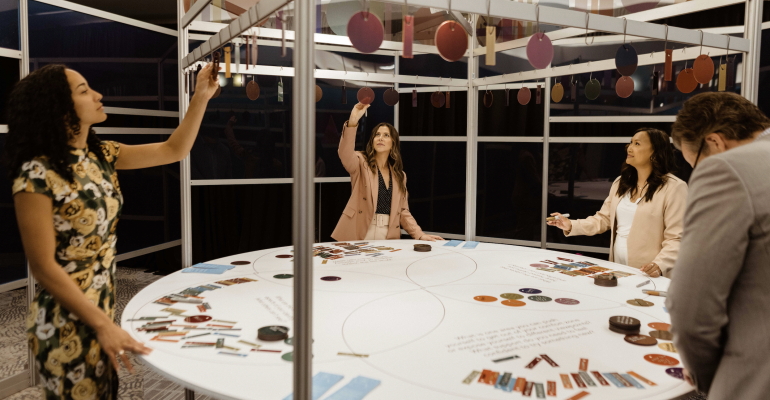Before the Covid pandemic, networking was a key element of most business events. But after a nearly two-year shutdown of in-person meetings, the perspectives and priorities of corporate and association event attendees are permanently changed. Specifically, the concept of networking has become dated, replaced by more refined ideas around belonging, engagement, and connection—the desired outcomes of face-to-face interaction as opposed to an activity that often feels shallow and transactional as well as difficult for all but the most socially-adept attendees.
To promote effective collaboration, knowledge exchange, and relationship building between meeting attendees in the new environment, the Professional Convention Management Association, the Corporate Event Marketing Association, and Marriott International spent more than a year working on a blueprint called “Guiding Principles in Experience Design: Six Truths for Innovative Event Strategies.” It was unveiled during Marriott’s Association Masters customer conference, held in Phoenix from May 31 to June 2 for more than 300 association-event planners.
Research for the document began with interviews of 60 meeting planners across various industries by experiential-engagement agency Storycraft Lab. This was followed by roundtable discussions among experience-design thought leaders to integrate planners’ trend observations into event strategies. The result was six principles to drive innovation in event experiences over the next several years:
Exploring Identities: People want to understand their individual uniqueness, but also find where they overlap with others. This is fundamental to becoming part of specialized communities. The role of the event designer is to reimagine networking and create an environment where people feel open enough to stretch their minds and fully participate.
Architecting Choice: Audiences want to be involved in selecting the event pathways available to them. They also want adequate support and resources to make clear and informed choices. To develop the attendee experience, event strategists must understand the problems they’re solving from the perspective of the audience. Asking the audience why they are coming to an event is a step in the right direction.
Designing for Belonging: A sense of belonging for attendees should be a central mission for the experiences that event strategists create. When all attendees can feel included for who they are, their involvement with the event will be more positive and impactful. Event strategists must design events for inclusion, considering different learning abilities, social abilities, and other elements that accommodate diversity.
Emotional Data: Understanding the emotional state of participants is key to driving loyalty and decision-making. Event strategists need to discover how to leverage attendees’ self-reported emotional data by measuring it consistently and analyzing it properly. Audience-segmentation tools use personalization to create dialogue and encourage preference sharing from attendees. When used pre-event as a vehicle for experience design, these tools can demonstrate how the emotional data has been used to create better experiences for the audience.
Power of Play: The process of playing with something—breaking it apart and putting it back together—creates opportunities for ideation and collaboration. Developments in A.I. are opening new avenues for experimenting, and playing with it and other evolving technologies can facilitate attendee connection. Event designers might want to create play-first spaces that celebrate testing and experimentation to help audiences better understand new ideas and build personal bonds.
Value of Values: Audiences search for experiences that provide value beyond the dollar, prioritizing elements like sustainability, inclusion, community engagement, time, and uniqueness. Distinct, unique value propositions for events continue to be crucial in satisfying audience needs. For the time-conscious, the virtual/hybrid experience will remain essential to connect to their communities wherever they are.
At the Association Masters event, planners participated in activations that demonstrated each of the six principles (see photos below). Upcoming industry events that will offer these activations for planners include PCMA EduCon, June 25-28 in Montreal, and CEMA Summit, August 6-8 in Salt Lake City.







